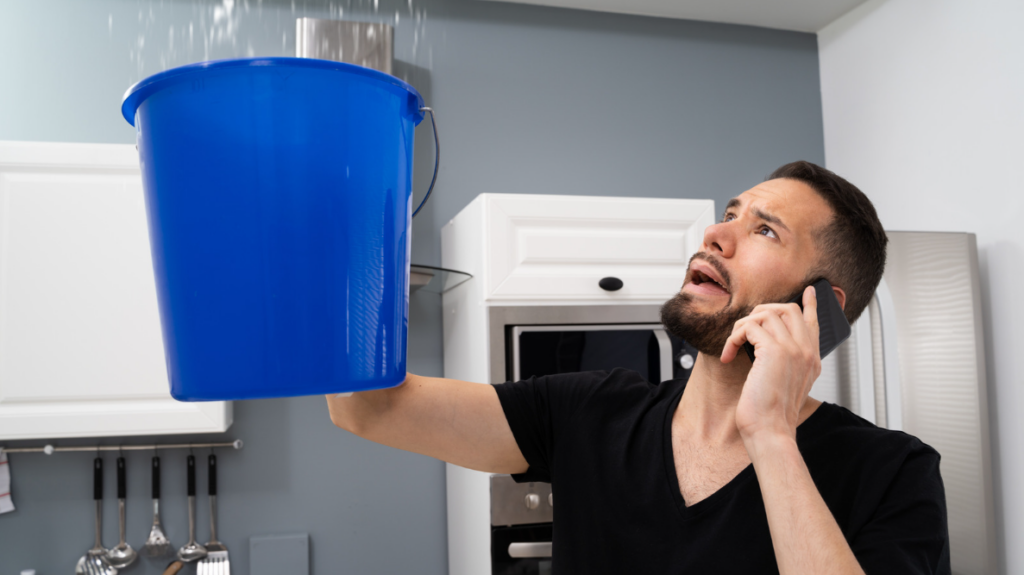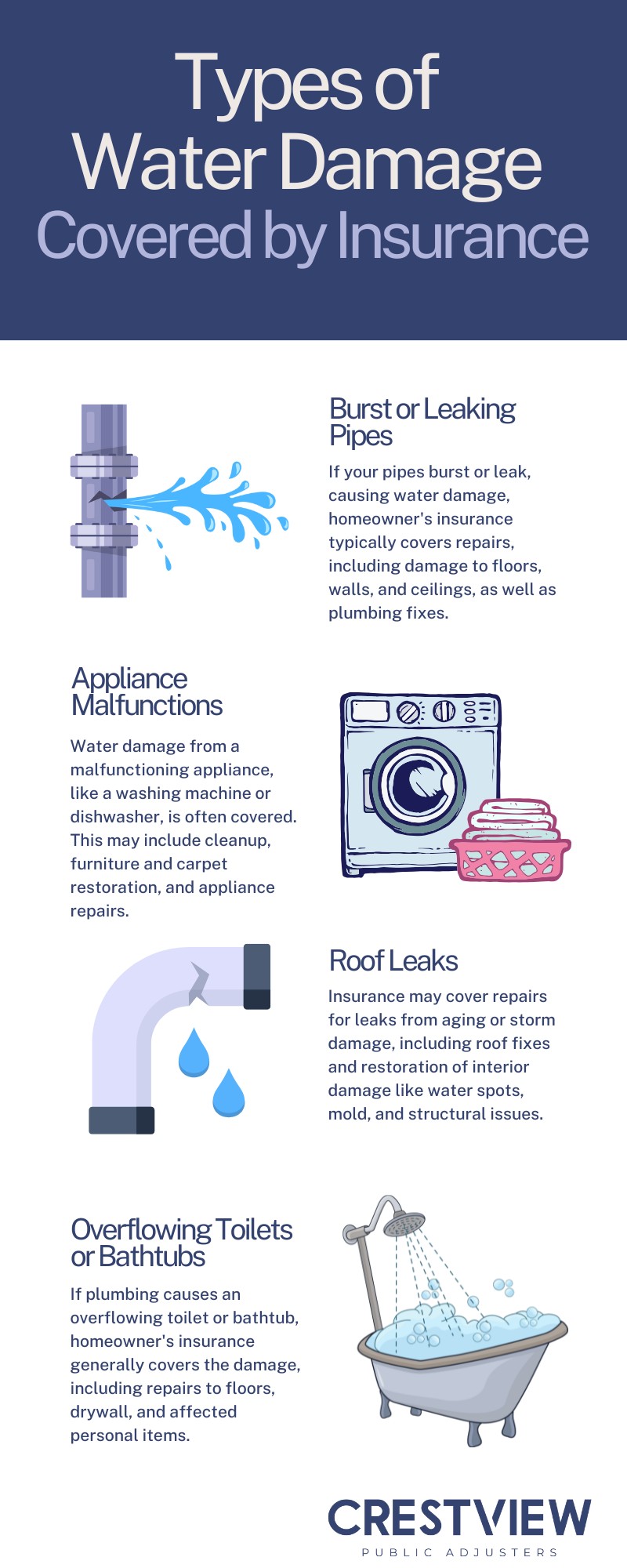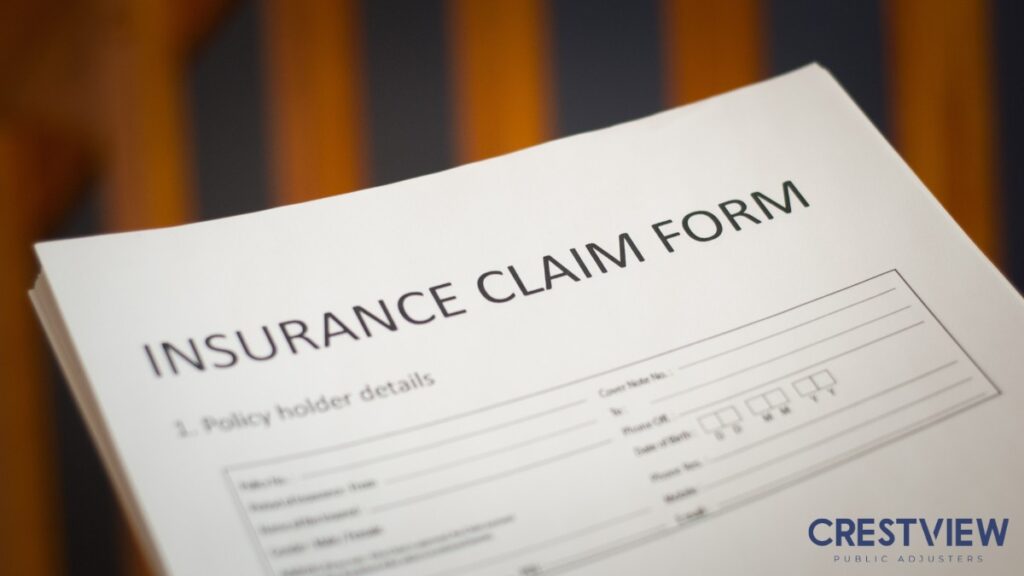Key Points:
- Understanding the types of damage typically covered in a water damage claim.
- Specific exclusions to watch out for in a water damage claim.
- How a public adjuster can help maximize the compensation for your water damage claim.

Water damage claims can be complex, with many policyholders unsure of what’s included in their coverage. In fact, water damage is one of the most common types of property damage insurance claims in the United States.
In general, a water damage claim covers the damage caused by water-related incidents, but the specifics of what is included depend on your policy. Whether it’s damage from a burst pipe, a leaking roof, or flooding due to a natural disaster, there are several factors that will determine how much compensation you receive. Let’s break down what is covered in a water damage claim and help you understand the ins and outs of your insurance policy.
What Is Covered in a Water Damage Claim?
Water damage claims typically cover damages caused by water intrusion due to certain incidents, such as burst pipes or leaking appliances. However, the water damage coverage largely depends on the type of policy you have, whether it’s a homeowner’s or a renter’s insurance policy. Keep in mind that each policy has its own exclusions and limitations, such as flooding from natural disasters, which may require separate flood insurance.
Types of Water Damage Covered by Insurance
When you file a water damage claim, the type of damage you are claiming is a key factor. Here’s a deeper look at the different water-related damages typically covered by insurance:

While these are the typical scenarios that most insurance policies cover, it’s important to verify with your provider what specific water-related damages fall under your coverage.
What Is Not Covered by a Water Damage Claim?
Not all water damage is covered under standard insurance policies, and understanding what is not covered in a water damage claim can help you avoid unexpected out-of-pocket expenses. Here are a few common exclusions:
1. Flood Damage
If your home or business is affected by flooding from a natural disaster, such as a hurricane or torrential rains, a standard homeowner’s policy will not cover the damages. For flood damage, you need separate flood insurance, which is often required if you live in a high-risk flood zone.
2. Negligence or Lack of Maintenance
If the water damage is the result of poor maintenance or neglect, such as a slow leak that was ignored for months, your insurance claim may be denied. Regular maintenance is essential to prevent issues that may not be covered by your policy.
3. Sewer Backup
Damage caused by a sewer backup is another common exclusion. Many insurance policies don’t cover sewer backups unless you have specific riders or add-ons to your policy.
4. Wear and Tear
Over time, normal wear and tear can cause leaks or other water-related damage. However, damage from general deterioration of pipes or appliances due to age is typically excluded from most water damage claims.

How to File a Water Damage Claim
Filing a water damage claim can be a straightforward process, as long as you know the correct steps to take. Here’s a simple breakdown of the steps involved:
1. Document the Damage
Before you start the cleanup, take clear photos and videos of the water damage. This documentation will be crucial when submitting your claim and can ensure that you’re adequately compensated.
2. Contact Your Insurance Provider
Notify your insurance provider as soon as possible. The quicker you report the damage, the faster they can begin processing your claim. You may need to provide them with the documentation of the damage and your policy details.
3. Hire Professionals for Cleanup
Depending on the severity of the water damage, it may be necessary to hire professionals for cleanup and repair. These specialists can help mitigate further damage and begin the restoration process.
4. Meet with an Adjuster
Your insurance provider will likely send an adjuster to assess the damage. They will evaluate the extent of the water damage and help determine the compensation amount.
5. Review the Claim Outcome
Once the insurance company has reviewed the damages, they will provide you with an offer. At this point, you can either accept or negotiate the claim amount.

How a Public Adjuster Can Help with Your Water Damage Claim
Navigating the water damage claim process on your own can be challenging, especially if you feel the insurance company’s offer isn’t adequate. That’s where a public adjuster can be invaluable. Public adjusters work on behalf of the policyholder, not the insurance company, to ensure that you receive a fair settlement.
Here’s how a public adjuster can assist:
- Expert Assessment A public adjuster will conduct a thorough evaluation of the damage, ensuring that nothing is overlooked. They are trained to identify all sources of water damage, including hidden issues like mold or structural damage.
- Negotiation with the Insurance Company If your insurer offers a settlement that’s lower than expected, a public adjuster can help negotiate a higher payout. They have experience in understanding policy language and can advocate on your behalf.
- Maximizing Your Claim Public adjusters understand what’s covered in a water damage claim and can ensure that every item, from structural damage to personal belongings, is included in your settlement.
Maximize Your Water Damage Claim with Crestview
If you’ve experienced water damage, don’t navigate the claims process alone. Crestview is here to help.
Our expert public adjusters in NYC, NJ, and Florida specialize in water damage claims and can work with your insurance company to ensure you receive the maximum compensation. We’ll handle all aspects of your claim, from documentation to negotiation, so you can focus on what matters most – restoring your property.
Get in touch today to schedule a consultation and start the process with confidence.

